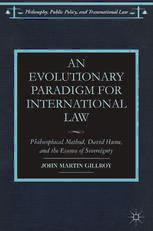
An Evolutionary Paradigm for International Law: Philosophical Method, David Hume, and the Essence of Sovereignty PDF
Preview An Evolutionary Paradigm for International Law: Philosophical Method, David Hume, and the Essence of Sovereignty
An Evolutionary Paradigm for International Law Philosophy, Public Policy, and Transnational Law Series Editor: John Martin Gillroy, Professor of International Relations and Found- ing Director of the Graduate Programs in Environmental Policy Design at Lehigh University, Pennsylvania. http://ir.cas2.lehigh.edu/content/john-martin-gillroy A Note from the Editor This new series for Palgrave Macmillan seeks, for the first time with a major pub- lisher, to take the philosophical and public policy foundations of legal practice seri- ously; that is, not in terms of bits and pieces of theory or policy used to illustrate empirical claims, but as a systematic and integral basis for the study of codified law. The series will pursue scholarship that integrates the superstructure of the positive law with its philosophical and public policy substructure, producing a more three- dimensional understanding of transnational law and its evolution, meaning, impera- tives, and future. For the purposes of this series, transnational law includes the traditional catego- ries of comparative and international law and seeks to understand the role of not just states, but persons, international organizations, nongovernmental organizations, and governments that create or use law that transcends sovereign states. The series encourages an interdisciplinary approach to transnational law and seeks research reports, original manuscripts, or edited collections that explore the essence of legal practice in both the public policy arguments that inform legal discourse and the philosophical precepts that create the logic of concepts inherent in policy debate. The series aims to expand the types and use of philosophical and policy paradigms exploring the nature of transnational law, so that its empirical dimensions are better illuminated for practitioners and scholars alike. An Evolutionary Paradigm for International Law Philosophical Method, David Hume, and the Essence of Sovereignty John Martin G illroy Philosophical Method, Policy Design, and the International Legal System Volume I AN EVOLUTIONARY PARADIGM FOR INTERNATIONAL LAW Copyright © John Martin Gillroy, 2013. Softcover reprint of the hardcover 1st edition 2013 978-1-137-37662-6 All rights reserved. First published in 2013 by PALGRAVE MACMILLAN® in the United States— a division of St. Martin’s Press LLC, 175 Fifth Avenue, New York, NY 10010. Where this book is distributed in the UK, Europe and the rest of the world, this is by Palgrave Macmillan, a division of Macmillan Publishers Limited, registered in England, company number 785998, of Houndmills, Basingstoke, Hampshire RG21 6XS. Palgrave Macmillan is the global academic imprint of the above companies and has companies and representatives throughout the world. Palgrave® and Macmillan® are registered trademarks in the United States, the United Kingdom, Europe and other countries. ISBN 978-1-349-47779-1 ISBN 978-1-137-37665-7 (eBook) DOI 10.1057/9781137376657 Library of Congress Cataloging-in-Publication Data Gillroy, John Martin, 1954– An evolutionary paradigm for international law : philosophical method, David Hume, and the essence of sovereignty / John Martin Gillroy. pages cm Includes bibliographical references and index. 1. Sovereignty. 2. International law—Philosophy. 3. Hume, David, 1711–1776. 4. Recognition (International law) I. Title. KZ4041.G55 2013 341.26—dc23 2013024133 A catalogue record of the book is available from the British Library. Design by Newgen Knowledge Works (P) Ltd., Chennai, India. First edition: December 2013 10 9 8 7 6 5 4 3 2 1 For Margaret M. Murray (Writer, Editor And Much More) This page intentionally left blank Contents List of Illustrations i x Preface xi Acknowledgments x vii Prologue: Sovereignty and Practical Reason 1 1 Philosophical Method, Hume’s Philosophical-Policy, and Legal Design 7 2 “Effectiveness”: A “Local” Rule of Recognition and the Foundation for Justice-As-Sovereignty 49 3 “Progressive Codification”: A Rule of Adjudication and the Evolution of Justice-As-Sovereignty 1 07 4 “Peaceful Cooperation”: A Universal Rule of Recognition and the Strategic Context of Justice-As-Sovereignty 151 5 “Non-Intervention”: A Rule of Change Protecting “Process” from “Principle” 209 6 Conclusion: The Metaphysical Elements of Sovereignty 257 Notes 267 Bibliography 291 Index 299 This page intentionally left blank Illustrations Figures 1.1 P hilosophical-policy and legal design 9 1.2 H ume’s philosophical-policy paradigm 45 2.1 H ume’s concept of law 90 3.1 T he evolution of the rule of law 1 37 6.1 T he metaphysics of sovereignty 261 Matrices 1.1 C oordination game 30 4.1 P risoner’s dilemma game 169 4.2 S tag hunt game 1 79 Table 6.1 J ustice-As-Sovereignty: Transcending hypocrisy 259
